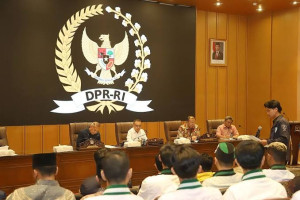Bali to implement a quota system to tackle problematic foreign tourists
Bali Governor Wayan Koster is currently working on implementing a quota system aimed at restricting the influx of foreign tourists to Bali.
This visionary move arises from the growing influx of foreign tourists on the Island of the Gods. “We want to attract quality tourists who not only appreciate Balinese culture but also uphold local values and traditions,” Koster said.
Regarding this, Governor Koster is set to bolster the standards for preserving Balinese cultural tourism through the implementation of Bali Province Regional Regulation (Perda) No. 5/2020.
Initially, Governor Koster plans to conduct a thorough analysis of the current influx of foreign tourists entering Bali. His objective is to maintain the annual number below 6 million individuals, although he has yet to define the precise target figure.
Koster emphasizes that the quota system or restrictions on foreign tourists will be accompanied by well-defined terms and conditions. "A comprehensive evaluation is necessary to regulate the entry of foreign tourists to Bali. For instance, there might be a consideration of a limit of seven million individuals based on certain criteria," he added.
In line with this policy, the Head of the Bali Tourism Office Tjok Bagus Pemayun stated that the Bali Provincial Government will establish specific terms and conditions to tackle problematic foreign tourists.
Pemayun confidently expressed that he has no concerns about the potential impact of the foreign tourist quota on Balis’ regional revenue (Pendapatan Asli Daerah - PAD). He believed that it is more favorable for Bali to host a smaller number of foreign tourists who choose to stay an extended period, rather than a large influx of tourists for just a week.
Challenges of booming foreign tourism in Bali
Before the COVID-19 pandemic, Bali experienced a steady rise in the influx of foreign tourists. The peak was reached in 2019, with a total of 6.5 million foreign visitor arrivals, surpassing Bali’s population of 4.2 million. This was largely attributed to the no-visa policy implemented for 40 countries,
While the substantial number of visits brought economic advantages to the district and city government through hotel and restaurant taxes (PHR), the Bali Provincial Government did not directly benefit from these taxes as they were collected by the respective local governments.
Nevertheless, the influx of foreign tourists also came with its own set of challenges. The average duration of their visits to the island dwindled from two weeks to a mere five days. Furthermore, their expenditure during their stay in Bali also saw a decline.
Consequently, these factors had an impact on the island’s carrying capacity. Challenges such as congestion and increased garbage accumulation became more prevalent during peak visit periods, particularly from May to August and December to January. Moreover, there has been a recent increase in reports of social and traffic violations committed by foreign tourists.
“If the duration is longer, it benefits the local revenue. For instance, if there were 2.3 million foreign tourists last year and they stayed for two weeks, they would spend more money,” Pemayun said. Therefore, the Bali Provincial Government prioritizes the quality of foreign tourists over the sheer quantity of visits.
Bali’s foreign tourist quota dilemma
Despite challenges related to the influx foreign tourists in Bali, the proposed restriction could also potentially lead to new dilemmas. The Badung chapter of Indonesian Hotel and Restaurant Association (PHRI) has disclosed that Bali boasts a total of 130,000 accommodation rooms. To achieve a 50 percent occupancy rate, it would necessitate over 5 million foreign tourist visits per month, considering this substantial room capacity.
Another challenge arises from the wide range of accommodations available in Bali, encompassing not only high-quality five-star hotels but also a plethora of options priced below IDR 500,000. It is important to note that these lower-priced accommodations might not necessarily cater or attract quality tourists, even if restrictions are set in place.
Tag
Already have an account? Sign In
-
Start reading
Freemium
-
Monthly Subscription
20% OFF$29.75
$37.19/MonthCancel anytime
This offer is open to all new subscribers!
Subscribe now -
Yearly Subscription
33% OFF$228.13
$340.5/YearCancel anytime
This offer is open to all new subscribers!
Subscribe now







